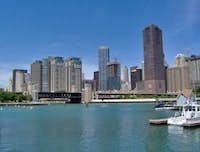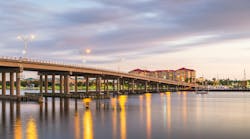The U.S. Environmental Protection Agency (EPA), the Department of Justice, and the state of Illinois announced a Clean Water Act settlement with the Metropolitan Water Reclamation District of Greater Chicago (MWRD) to resolve claims that untreated sewer discharges were released into Chicago area waterways during flood and wet-weather events.
The settlement will safeguard water quality and protect people’s health by capturing storm water and wastewater from the combined sewer system, which services the city of Chicago and 51 communities.
“The settlement will prevent polluted storm water runoff from flowing through Chicago-area neighborhoods and into local waterways,” said Cynthia Giles, assistant administrator for EPA’s Office of Enforcement and Compliance Assurance. “Combining innovative storm water management practices, like rain gardens, with necessary infrastructure overhauls will protect peoples’ health and provide area residents with improved recreational opportunities.”
Under the settlement, MWRD will work to complete a tunnel and reservoir plan to increase its capacity to handle wet-weather events and address combined sewer overflow discharges. The project will be completed in a series of stages in 2015, 2017 and 2029.
The settlement also requires MWRD to control trash and debris in overflows using skimmer boats to remove debris from the water so it can be collected and properly managed, making waterways cleaner and healthier. MWRD is required to implement a green infrastructure program that will reduce storm water runoff in areas serviced by MWRD by distributing rain barrels and developing projects to build green roofs, rain gardens, or use pervious paving materials in urban neighborhoods. MWRD has agreed to pay a civil penalty of $675,000.
Raw sewage contains pathogens that threaten public health, leading to beach closures and public advisories against fishing and swimming. This problem particularly affects older urban areas where minority and low-income communities are often located.
Keeping raw sewage and contaminated stormwater out of the waters of the U.S. is one of EPA’s National Enforcement Initiatives for 2011 to 2013. The initiative focuses on reducing discharges from sewer overflows by obtaining cities’ commitments to implement timely, affordable solutions to these problems, including the increased use of green infrastructure and other innovative approaches.
Source: EPA


